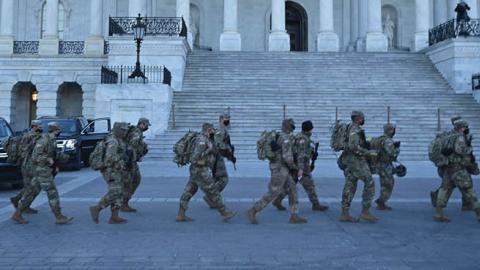The mood in the U.S. Capital on inauguration day resembled that of 160 years ago. Like today, the Capitol was surrounded by a massive military contingent to protect the incoming president, Abraham Lincoln. In the four months since Lincoln was elected, seven states had seceded from the Union, seeking to preserve the institution of slavery. Of course, despite its seriousness, the January 2021 Capitol riot does not approximate the severity of secession. Nevertheless, it indicated the extent of the divisions within the American republic.
Unlike in 1861, when the U.S. could be split into two geographical blocs, modern America’s divisions are not as neat. Instead, the divide is between urban population centers — mostly on the coasts, but also in the country’s middle — and suburban and rural communities. The central point of tension is, once again, cultural. But the details are messier. At issue is not the institution of slavery, but rather the concept of American identity and history. Both the left and the right contain their own radical elements, whose rhetoric has suffused the party establishments. This suffusion marked the path to the Capitol riot: By fixating upon the existential stakes of the so-called Culture War, deeply partisan leaders have nurtured an environment that animates political violence.
The crisis of the past three months — indeed, of the past year — has demonstrated the efficacy of the American military, and the respect for it that the public holds. The U.S. military spearheaded America’s COVID-19 responses; the National Guard was tasked with maintaining order during this summer’s riots; most notably, it was charged with protecting Mr. Biden’s inauguration and preventing a far more dangerous event on Jan. 20 than had occurred two weeks prior. The inauguration was peaceful.
Proportionally, the American South provides far more recruits than any other region. Military service is increasingly a family tradition, with sons and daughters continuing their mothers’ and fathers’ tradition. The divisions that characterize the American body politic likely exist within the U.S. military.
In a time of extreme partisan and cultural tension, this could be dangerous. The armed services are charged with defending America’s political interests abroad, independent of political loyalty. They are also tasked with, in extreme circumstances, preserving domestic order. The National Guard executes this mission. These citizen-soldiers stand as a ready reserve that can be called upon to supplement the active-duty military overseas and complete domestic non-combat missions that a standing army would otherwise conduct.
Moreover, it has been apparent for some time that the armed services are not immune from the boils that afflict society. As of 2008, the FBI estimated that one to two percent of service members were affiliated with gangs. During the Iraq War, “gang tags” appeared throughout the conflict — notably, criminal groups from of multiple ethnic backgrounds were represented.
To ensure the inauguration’s security — and considering the dangers, and potential reality, of military penetration by radical elements — the FBI instituted vetting protocols for Guardsmen deployed to the Capitol and removed a dozen Guardsmen for apparent ties to white supremacist and other anti-government groups. Considering the circumstances, this may have been reasonable. Indeed, it is a reassuring sign that, of the 25,000 Guardsmen deployed, only 12 were identified as potential threats.
Nevertheless, the action sets a worrisome precedent. The U.S. Constitution’s writers began Article II, Section 2 by making the president the commander-in-chief of the armed forces. The founders wanted clarity about civil-military relations. In the modern West alone, the United States’ civil-military tradition is a peculiar outlier. Modern France began with a Napoleonic coup that unified military and political power in a single individual; it has not shaken this frame of mind since. Charles de Gaulle’s admittedly legitimate coup was necessary because French society — and political tradition — required the strong, centralized rule that a military approach could provide. Germany’s descent into Hitlerite tyranny began with the shredded linkage between civilian and military authorities. The German General Staff formulated policy independent of political authorities, and when given absolute command in 1916, unleashed the forces of total war that later would define Nazism. Even Britain is not exempt. Britain’s “New Model Army” became politically dominant during Oliver Cromwell’s Commonwealth. After the restoration, Parliament ensured its direct control of the army, using it as a check on sovereign power to engineer a tense political compromise.
By contrast, the United States has a remarkably stable civil-military tradition. The Continental Congress consistently underfunded the Continental Army because they feared a standing military force, but George Washington — first as general and then as president — inculcated within the army a culture of subordination to, and respect for, civilian control. This culture has been tested in the past, most notably in the relationship between President Truman and General MacArthur — but it proved so robust that, even during the 1930s, the military planned for future Asian and European wars based upon clear political and strategic analysis.
The most common civil-military issue in the US has been military involvement in political decision-making. The concern is that, by turning to military and former military officers and placing them in significant policy positions, a culture will develop in which generals and admirals, and young officers who aspire to flag rank, will expect policy appointments, and make partisan considerations central during their military careers.
The FBI’s vetting program, however, generates a separate worry: that political authorities will make ideology a component of political promotion, fraying the military’s loyalty to the U.S. Constitution and introducing a specific partisan perspective. If political violence continues, the military will be called upon to preserve order. And with the precedent of ideological examination, it is possible that the Senate, exercising its power to confirm or deny senior-level military promotions, may conduct ideological tests during promotion hearings.
Encouraging partisan tests for military officers would transform the armed services and inculcate partisan loyalties in a necessarily universal institution. The practical consequences of military partisanship are clear.
The civil wars that ultimately destroyed republican Rome were facilitated by the personalization of military loyalty. Lucius Cornelius Sulla, leader of the Republic’s aristocratic optimates, could only march on Rome because of the personal loyalty he commanded in his soldiers, since following Gaius Marius’ military reforms, Roman generals, rather than the state more broadly, were responsible for their soldiers’ pay. Rome’s subsequent civil wars followed a similar pattern, with generals conquering territory, increasing political power, and then turning to their legions for support during crises. It took 60 years of civil war and Augustus Caesar’s final ascent to power to stabilize the situation. By that point, Rome had transitioned from republic to empire.
We are not close to Rome’s plight as her republic collapsed. Still, the potential fragmentation of military loyalty is a threat to the American republic. As President Biden assumes office, and his party attempts to govern a divided country with very tenuous control of Congress, the temptation may exist to broaden ideological examination of the military. This must be resisted.
Read in The Hill















